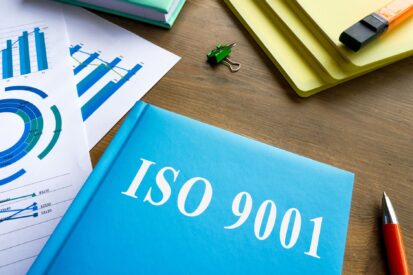As businesses evolve and adapt to a rapidly changing world, implementing best practices and internationally recognised standards has become crucial for their growth, reputability and sustainability.
ISO (International Organisation for Standardisation) standards, such as ISO 9001, ISO 27001 and ISO 45001, are designed to help organisations obtain consistent, high-quality performance in their respective domains: quality management, information security management and occupational health and safety management.
Choosing the right ISO standard may seem like a daunting task, but understanding the key differences and unique advantages of each can help organisations make informed decisions about which standard best suits their needs. In this blog, we will delve into the essential distinctions between ISO 9001, ISO 27001 and ISO 45001 and discuss how implementing one or more of these standards can significantly benefit your organisation.
Furthermore, we will illustrate how ISO 9001 Consultants Australia can provide valuable expertise and support to help your organisation navigate the complexities of achieving ISO certification.
Although each ISO standard has its distinct focus and objectives, they all share a common purpose: enhancing organisational performance, efficiency and sustainability through the implementation of internationally recognised best practices and management systems. ISO 9001, ISO 27001 and ISO 45001 are considered high-impact standards due to their broad applicability across various industries and sectors.
Implementing these standards can be a game-changer for organisations, resulting in improved customer satisfaction, increased operational efficiency, reduced risk exposure and enhanced stakeholder confidence. By examining the key differences and overlaps between these three standards, organisations can select the most appropriate standard to address their unique objectives and challenges.
Moreover, partnering with ISO 9001 Consultants Australia can provide essential services and guidance throughout the implementation and certification process, ensuring that your organisation receives the maximum benefits from adopting ISO standards.
ISO 9001: Quality Management Systems
ISO 9001 is the most widely adopted and recognised quality management system standard worldwide. This standard helps organisations ensure their products and services consistently meet customer requirements and adhere to statutory and regulatory requirements. Implementing ISO 9001 can provide numerous benefits, such as improved customer satisfaction, increased operational efficiency and a reduction in product defects and non-conformities.
Key Focus Areas:
- Quality policy and objectives
- Quality planning and risk analysis
- Customer focus and satisfaction
- Process approach for operational efficiency
- Continual improvement
ISO 27001: Information Security Management Systems
In today’s data-driven world, ensuring the confidentiality, integrity and availability of information assets is paramount. ISO 27001 is the internationally recognised standard for information security management systems, providing a systematic approach to manage an organisation’s sensitive data and reduce the risk of data breaches and cyberattacks. Implementing ISO 27001 demonstrates an organisation’s commitment to information security, instilling confidence among clients, regulators and other stakeholders.
Key Focus Areas:
- Information security policy and objectives
- Information security risk assessment and treatment
- Security controls and best practices
- Incident management and response
- Continual improvement
ISO 45001: Occupational Health and Safety Management Systems
Workplace safety and employee well-being are vital for organisational success. ISO 45001 is an international standard for occupational health and safety management systems, designed to reduce workplace hazards and promote a safe and healthy work environment. Implementing ISO 45001 can lead to a range of benefits, including fewer accidents, reduced downtime and sustained compliance with legal and regulatory requirements.
Key Focus Areas:
- Health and safety policy and objectives
- Hazard identification and risk control
- Legal compliance and regulatory requirements
- Worker participation and consultation
- Continual improvement
Choosing the Right ISO Standard for Your Organisation
Selecting the most suitable ISO standard(s) for your organisation depends on various factors, such as your industry sector, specific needs and strategic objectives. Consider the following recommendations when choosing the appropriate standard:
- Identify Your Organisation’s Priorities: Determine the key areas in which you would like to improve and align them with the corresponding ISO standard(s). For example, if improving product quality is a top priority for your organisation, ISO 9001 is a suitable choice.
- Evaluate Your Risk Profile: Assess the risks associated with your organisation’s activities, such as information security breaches or workplace incidents. If your risk profile suggests significant vulnerabilities in a particular area, consider implementing the relevant ISO standard(s).
- Consider Legal and Regulatory Requirements: Certain industries or countries may mandate the implementation of specific ISO standards for compliance purposes. Ensure that your organisation adheres to these requirements by implementing the corresponding ISO standard(s).
- Assess Your Current Management Systems: Review the management systems already in place within your organisation to identify gaps and overlaps that can be enhanced through ISO standard implementation.
Integrating Multiple ISO Standards
Organisations seeking to implement more than one ISO standard can benefit from an integrated management system (IMS) approach. This method combines ISO 9001, ISO 27001 and/or ISO 45001 into a single, streamlined system. An IMS offers several advantages, including:
- Consistency in management system documentation, policies and procedures
- Minimised duplication of effort across different standards
- More efficient and cost-effective auditing process
How ISO 9001 Consultants Australia Can Support Your ISO Journey
Regardless of which ISO standard(s) your organisation chooses, ISO 9001 Consultants Australia offers unparalleled expertise and support to ensure the successful implementation, certification and maintenance of these standards, including:
- Gap analysis and risk assessment services
- Tailored implementation plans and project management
- On-site training and education programs
- Internal and external auditing support
Conclusion
Selecting the right ISO standard for your organisation involves a careful assessment of your strategic objectives, risks and existing management systems. By understanding the key distinctions between ISO 9001, ISO 27001 and ISO 45001, your organisation can make informed choices about which standard(s) best align with your needs, promoting long-term growth, resilience and success.
ISO 9001 Consultants Australia is committed to providing the necessary guidance and resources to support your organisation throughout your ISO journey, helping you realise the myriad benefits of standards implementation and certification. Contact us if you need to know more about accreditation ISO 9001!








Users Comments
Get a
Quote